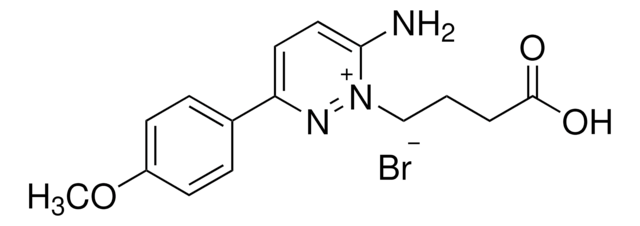About This Item
Recommended Products
form
powder
color
white
mp
203 °C (lit.)
SMILES string
[H][C@@]12C[C@@]3(O)[C@@]4([H])[C@H](C(C)=C)[C@]([H])(OC4=O)[C@@]5([H])OC(=O)[C@]1(O2)[C@@]35C.[H][C@@]67C[C@@]8(O)[C@@]9([H])[C@@H]([C@]([H])(OC9=O)[C@@]%10([H])OC(=O)[C@]6(O7)[C@@]8%10C)C(C)(C)O
InChI
1S/C15H18O7.C15H16O6/c1-12(2,18)6-7-10(16)20-8(6)9-13(3)14(7,19)4-5-15(13,22-5)11(17)21-9;1-5(2)7-8-11(16)19-9(7)10-13(3)14(8,18)4-6-15(13,21-6)12(17)20-10/h5-9,18-19H,4H2,1-3H3;6-10,18H,1,4H2,2-3H3/t5-,6+,7+,8+,9-,13-,14-,15+;6-,7+,8+,9+,10-,13-,14-,15+/m11/s1
InChI key
VJKUPQSHOVKBCO-NGKRNLQBSA-N
Gene Information
human ... GABRA1(2554) , GABRA2(2555) , GABRA3(2556) , GABRA4(2557) , GABRA5(2558) , GABRA6(2559) , GABRB1(2560) , GABRB2(2561) , GABRB3(2562)
Looking for similar products? Visit Product Comparison Guide
General description
Application
- as non-competitive antagonist for the γ-aminobutyric acid (GABAA) for studying synchronized burst (SB) dynamics
- as a component of extracellular saline for blocking glutamate and acetylcholine receptors in neurons
- as a component of artificial cerebrospinal fluid (ACSF) for voltage-clamp recordings studies in dissociated cortical neurons
Biochem/physiol Actions
Features and Benefits
Other Notes
Signal Word
Danger
Hazard Statements
Precautionary Statements
Hazard Classifications
Acute Tox. 2 Oral
Storage Class Code
6.1A - Combustible acute toxic Cat. 1 and 2 / very toxic hazardous materials
WGK
WGK 3
Flash Point(F)
Not applicable
Flash Point(C)
Not applicable
Personal Protective Equipment
Certificates of Analysis (COA)
Search for Certificates of Analysis (COA) by entering the products Lot/Batch Number. Lot and Batch Numbers can be found on a product’s label following the words ‘Lot’ or ‘Batch’.
Already Own This Product?
Find documentation for the products that you have recently purchased in the Document Library.
Customers Also Viewed
Articles
DISCOVER Bioactive Small Molecules for Neuroscience
DISCOVER Bioactive Small Molecules for Neuroscience
DISCOVER Bioactive Small Molecules for Neuroscience
DISCOVER Bioactive Small Molecules for Neuroscience
Our team of scientists has experience in all areas of research including Life Science, Material Science, Chemical Synthesis, Chromatography, Analytical and many others.
Contact Technical Service










